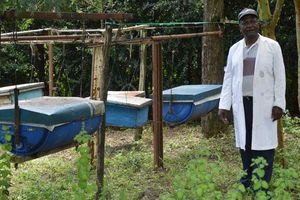
Nicholas Abach with some of his passion fruits. The Osure village resident has close to 150 passion fruit vines.
Nicholas Otieno Abach was to join the Technical University of Mombasa for a course in computer science five years ago.
Deep down, however, Abach knew white-collar jobs were not for him. Just two days to the admission day, he broke the bombshell to his parents who expressed shock and anger.
Eventually, they accepted his decision. Today, the 23-year-old is a full-time mixed farmer in Ndhiwa, Homa Bay County.
When the Seeds of Gold team landed in Osure village, it found Abach in a navy blue coat and gumboots, with a panga and jembe tending to his crops.
His main source of income is fish and fruits. On his 2.5-acre farm are bananas, passion fruits, mangoes, pineapple, avocados and other fruits.
Next to his house are 80 banana stools. About a kilometre away, Abach has planted 620 banana stools.
“I started with watermelon and butternut in 2019. The yields were good. After much research online, I settled on banana farming,” he says.
He grows five banana varieties – East Africa Highland F1, Ng’ombe, Low Mountain F1, Tissue Culture and Ugandan Matoke.
Abach goes for small and spear-shaped suckers.
“I got my first suckers from a reputable farmer in Ndhiwa. I learned to sterilise suckers by dipping them in hot water for 15 seconds,” he says.
Before transplanting suckers, Abach applies Tithonian fertiliser mixed with soil. He then waters the young plants.
Bananas take six to 12 months to mature to fruiting, depending on variety, temperature, weather and water supply.
Once the stool is a metre tall, it is important to pick three well developed suckers. Controlling the number of suckers in a plant is also key.
“For quality fruits, I remove the male bud once the last bunch of fruit appears. This ensures the fruits produced are big and healthy,” the farmer says.
He protects the banana bunches from direct sunlight and extreme weather conditions.
After fruiting, the mother plant is cut near ground level to stop it from reproducing. The old trunk quickly decomposes if cut into three or four pieces, with every piece split lengthwise. The remains serve as mulch or compost fertiliser.
Spread the risks
Abach sells a bunch for Sh200 to Sh500, depending on size.
“From my first banana harvest, I made Sh32,000. It encouraged me to expand the agribusiness and stagger production throughout the year,” he says.
Abach also has 240 healthy passion fruit plants. The plants prefer well-drained and soils rich in organic matter. Loam soil is ideal as it provides a balance of drainage and nutrient retention.
He establishes support structures before planting, as the passion fruit plant is a vine. This maximises space, improves air circulation and facilitates harvesting. He removes any tendril that develops on a plant.
With good farm management practices, a vine can yield close to 150 fruits. He makes a tidy sum from these fruits when bananas are not in season. “There will always be customers as long as the fruits are healthy,” he says.
Abach has two ponds stocked with 2,500 tilapia. “I got into fish farming after visiting farms in Rangwe. With Sh90,000 from my savings, I made the ponds and stocked them with male tilapia,” he says.
A kilogramme of tilapia goes for Sh300. “Venturing into agribusiness was a great decision. I am self-employed and occasionally hires casuals,” he says.
His greatest challenge is banana pests and diseases.
Prof Matthew Dida, a lecturer at Maseno University, encourages mixed farming, saying one spreads the risks.
“Livestock and plants complement each other, thus enhancing productivity,” Prof Dida says.
He advises banana farmers to be wary of environmental factors like high temperature, low humidity and lack of water as these can contribute to flower abortion.
“The banana farmer needs to ensure adequate supply of water, especially during the production stages to minimise losses,” the don adds.






